01/05/2020
NPCE, Ireland
Report from the NPCE member Dr. Vasilis S. Vasiliou, Clinical Psychologist & Researcher, School of Applied Psychology, University College Cork, Ireland.
News from Members Publications
Developing digital behavior change innovative interventions to tackle the problem of university students’ drug use
Although covid-19 pandemic has been a priority in research and public health due to its immediate negative influence worldwide, a newly emerging pandemic is on the verge and is spread across European universities; the university students’ drug use. The prevalence of college students who report using drug use occasionally (2-3 per month) or frequently (1-3 per week) is alarmingly increasing and includes different type of drugs, such as marijuana, cocaine, ecstasy, ketamine, and even “synthetic drug” students can purchase online.
Our NPCE member, Dr. Vasilis S. Vasiliou leads a Health Psychology strand of a multidisciplinary project called MyUSE (My Understanding of Substance-use Experiences). MyUSE is a novel digitally delivered behavior change intervention that was developed for, and with, college students. Below, Dr. Vasiliou reports several research outcomes from the group he works with to develop the intervention.
MyUSE: A multilevel interdisciplinary approach
Dr. Vasilis has been a member of an interdisciplinary team from the University College Cork (UCC) in Ireland, including Researchers and Practitioners from the School of Applied Psychology, Public Health, the Business & Information Technology centre, and the University Student Health Department. Together, they have undertaken a programmatic line of research over a four-year period to establish the evidence base around digital interventions in order to capture the unique context in which college students live, work, experiment, and use drugs. This interdisciplinary effort has resulted in several research outcomes that all have supported the development of the MyUSE phone (app) and web-based delivered intervention.
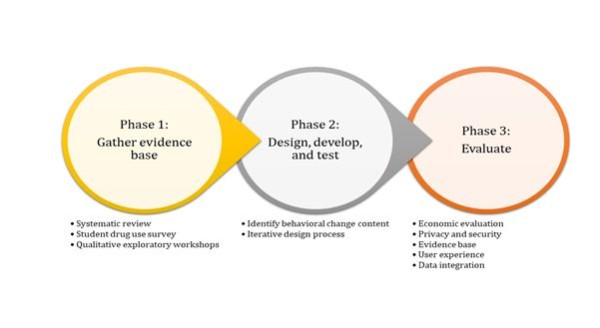
An Overview of the protocol for the development of the MyUSE can be retrieved from the following repository: doi:10.2196/17829
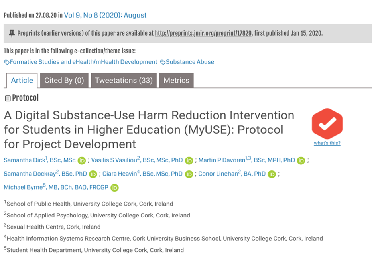
MyUSE: Harnessing expertise from multiple stakeholders
MyUSE combines expertise in a joint effort to develop a digitally delivered harm-reduction intervention for illicit drug use among students in higher education, bringing together rigorous user-centred design methodology and a robust behavioral change framework. The User-Centered Design (UCD) methodology is an iterative process that requires the early and active engagement of the target user through a number of activities including the development of user profiles, and early prototyping, and evaluation of the intervention.
One of the UCD approaches MyUSE has applied to analyse the needs, desires and limitations of the end user, is the personal building approach. This approach is one aspect of the UCD methodology which attempts to capture user’s expectations, prior experiences, and anticipated behaviours, leading to an understanding of how users think, feel, and behave as these are embodied in an intervention prototype. By incorporating specific user profiles tailored to the population, interventions can increase user motivation through carefully selected behaviour change techniques to maximize the formation of targeted behaviour changes. Through direct university students’ participation, MyUse developed five archetypes that have been contributed to the design of an acceptable and user-friendly intervention.
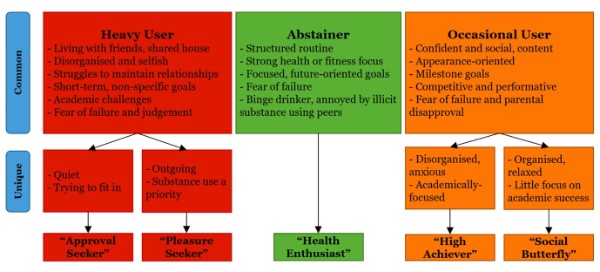
A full report of this research process can be retrieved from: DOI: 10.24251/HICSS.2020.415
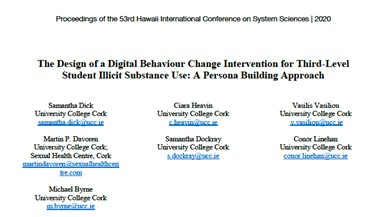
Key identified contextual behavior change strategies to support harm-reduction practices
Myuse harnesses behavior change theories and synthesized knowledge from qualitative participatory research with students, and a large survey on student experiences, capabilities and motivations to change their drug use behaviours to form an evidence base and guide the development of the specific content and structure of MyUSE. Based on this, we have identified the activities that would guide students to increase their awareness of their reasons for using drugs, identify their personal life and academic goals, as well as prioritise their personalized harm-reduction practices to use in case they need them. Our findings from a synthesis analysis resulted in key strategies, including increasing students behavioural awareness in relation to their decision to use drugs, identification of values and goals related to college life, and correction of their inaccurate perceptions about their peers’ drug use. MyUSE combines 29 behavior change techniques (BCTs) that were identified in a large mapping exercise, using the Behavioral Change Wheel Framework (Michie et al. 2013) and the Behavior Change Technique Taxonomy v1 (BCTTv1) (Michie et al. 2013). The 29 BCTs are allocated across eight identified clusters of behaviours, MyUSE attempts to change.
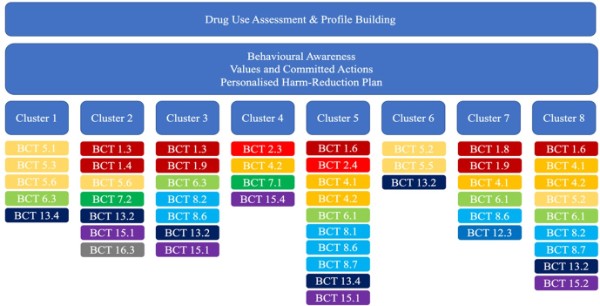
A full report of this large intervention mapping exercise can be retrieved from https://doi.org/10.21203/rs.3.rs-86503/v1
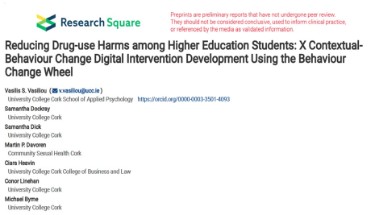
MyUSE attempts to reduce the harms from drug-use among higher education students by developing a new implementation practice by prioritizing actions towards the use of mobile apps and online platforms which are highly acceptable to student population. Future work includes a full clinical, technical, and economic evaluation of the MyUSE and implementation of the platform to different educational settings. Additionally, the security of the long-term effectiveness of MyUSE through longitudinal data gathering and analyses will highlight further points of refinements of the digital platform that will go along with the ongoing changes in the technology, the society, and the developmental trajectories young adults face. Ultimately, MyUSE attempts to become a case on how to bring synergies to tackle emerging societal challenges in psychotherapy provision and mental health across Europe.

